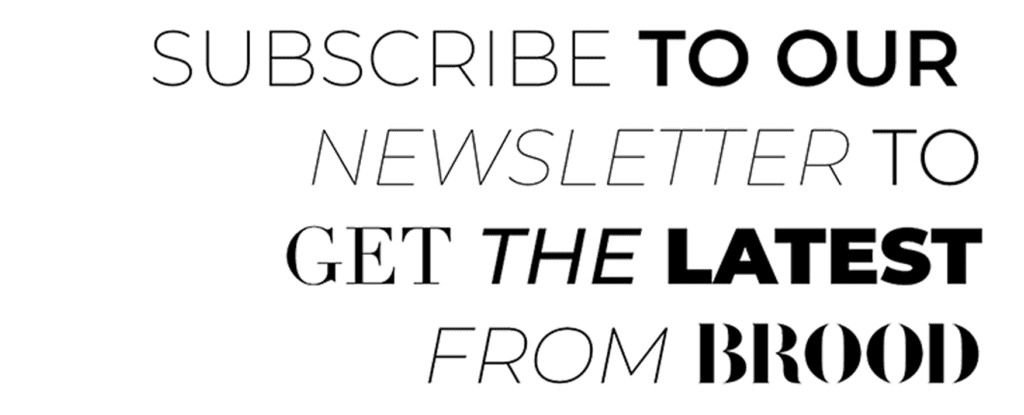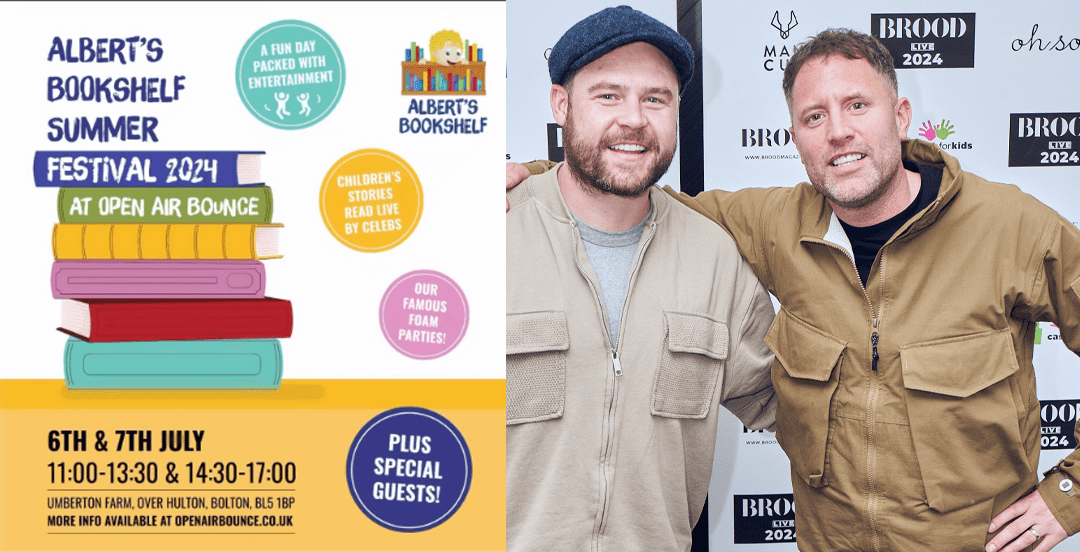“IT DOESN’T MATTER WHAT COUPLES IN SOCIETY DO, IF THEY AGREE TO ROLLING AROUND IN THEIR HIPPY BED, LETTING THEIR BABY SUCK ON THEIR T**S UNTIL YOU’RE BOTH 60, IF THAT’S WHAT YOU WANT – NO ONE SHOULD JUDGE ANYONE, I JUST THINK IT’S REALLY IMPORTANT TO AGREE ON HOW YOU WANT TO RAISE YOUR KID BEFOREHAND.”
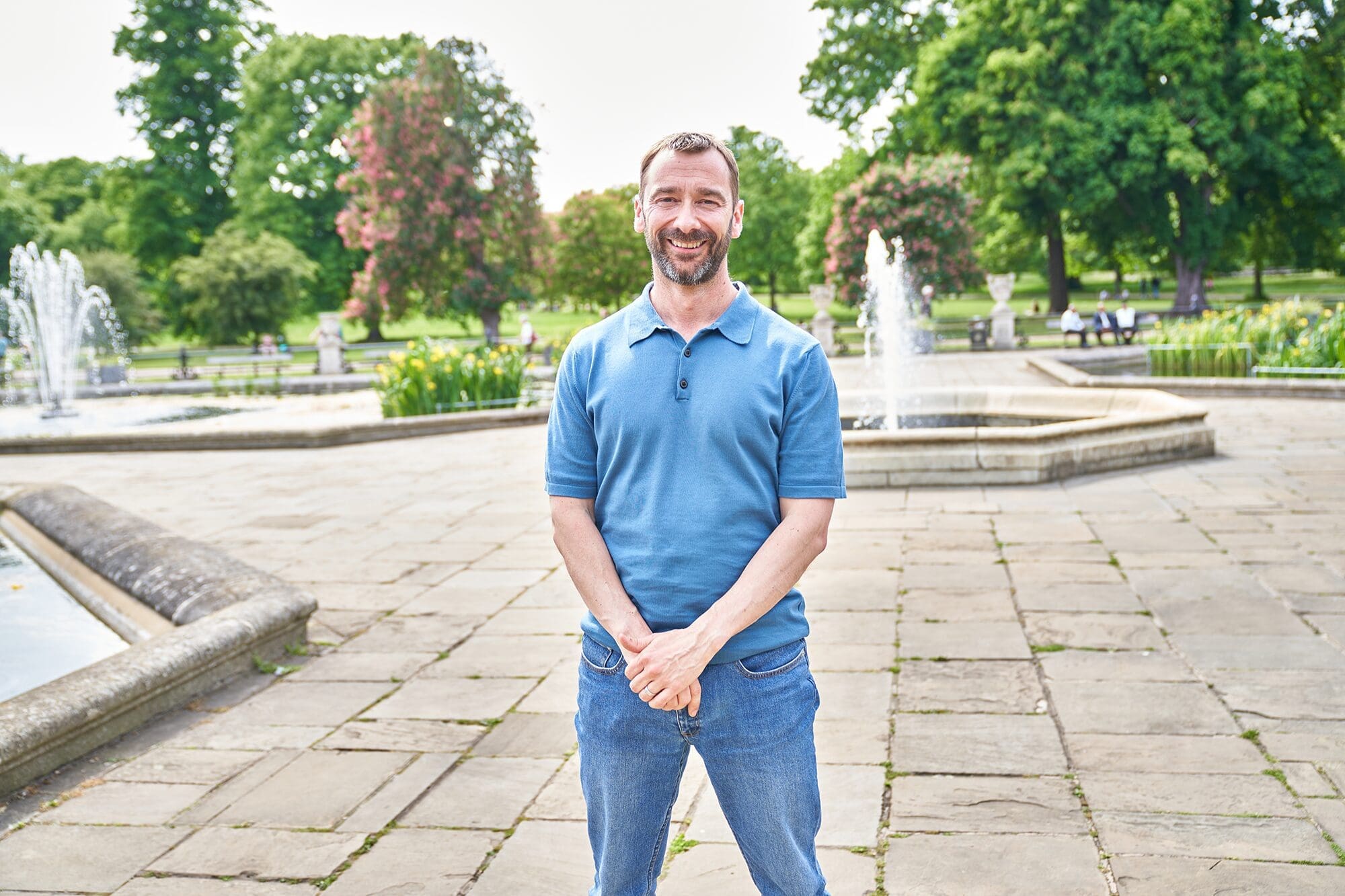
Charlie Condou on parenting as a gay man
CHARLIE CONDEAU © TOM PITFIELD PHOTOGRAPHY
Charlie Condou is a successful British Actor, Columnist and LGBTQ+ Rights Activist – not forgetting his most important role – a doting dad of two, to Georgia, 12, and Hal, 9. For as long as Charlie can remember, he always had an overwhelming desire to start a family and create the kind of upbringing that his own lacked. But as a Gay man in the nineties and early noughties, his dream of having a family seemed almost impossible.
“I was always determined that when I had the opportunity to be a parent, I was going to be a really good one.”
Undeterred by the lack options available to him at the time, Charlie kept the faith that one day he would become a father. Thankfully the universe delivered and Charlie, along with his husband of 17 years, Cameron, and their good friend Catherine, embarked on the journey of parenthood together, collectively creating an enviable co-parenting relationship, that has provided a loving and nurturing home for their two children.
We sat down with Charlie on a lovely sunny day in Hyde Park, London, and chatted through what made his desire to have a family so strong, how he managed to find a way to become a dad against all odds and how having kids has impacted his career decisions over the years. Charlie’s passion for his kids and his aspiration to be the best dad possible is both admirable and endearing, and we were enthralled by his incredibly story…
“I’ve wanted to have kids for as long as I can remember. I came from quite a difficult background; my dad was put in prison when I was about 6 months old, and although my mum did an amazing job she was trying to work three jobs and take care of me and my sister – who was around ten years older than me, so it was tough. I think because of this I was always determined that when I had the opportunity to be a parent, I was going to be a really good one. But then when I was 18 years old, I realised I was Gay, and I knew that having a family was going to be a lot more complicated than I thought. I’m friends with Kathy Burke, and I have been since my early twenties, and I can remember chatting to her about it and saying to her, ‘I’m finding it really hard to let go of the idea that I might be a parent, because this is what I’ve always wanted’. And Kathy in her inimitable fashion turned to me and said, ‘Don’t be a c**t, if you wanna be a parent, then be a parent!’ he laughs, “‘Just find a way to do it! Why would you let that get in your way, if it’s something that you really want, then just find a way of doing it!’ And she’s quite uncompromising in that way, and she’s my son’s godparent for that exact reason, as I wanted him to have a bit of that influence. But even though I knew she was right, I still wasn’t sure how I could make it happen, because you couldn’t adopt then as a gay man – certainly not as a single gay man! Surrogacy wasn’t a thing and even if it had, I didn’t have any money then to have gone down that route nor was co-parenting even a word then. So, I thought ‘what do I do?’ And I think for a lot of gay men from my generation, and Cameron’s – who’s ten years older than me, back then if you were gay man who wanted to be a parent, you either got together with a woman and went down that route – that lie – and lived your life that way, or you parked the idea and accepted it just wasn’t going to happen. But for me it was so important that I knew I was going to have to figure it out somehow, so when those kinds of conversations came up, I started saying ‘when I have kids’ instead of ‘if I have kids’. I suppose I did that to adopt the power of positive thinking, although I didn’t think of it that way at the time. So, I started talking to my female friends about it, and a few of them said, ‘Well if you’ve not met anyone by the time you’re forty, then I’ll have a baby with you!’ And being honest, there were varying degrees of seriousness in these conversations. But then I met Catherine and we became close friends; and as the years went on and she got nearer to forty we started to talk about it a lot, she desperately wanted to be a parent too. Then one day she came to me, and she wasn’t with anyone at the time, and she just didn’t want to wait any longer and miss out on the chance of becoming a mum, so she asked me if I wanted to talk about it properly, about the logistics of it all and how it would work for us. At this point I was with Cameron, and I had been for a few years, so that was obviously something I had to consider because there would be the three of us involved in co-parenting; that’s where the inspiration for my column name in The Guardian came from – The Three of Us. Anyway, we talked about it for a long time, probably for much longer than we needed to, because we talked about every eventuality – ‘What if someone moves to Australia’ he jokes “Or ‘What if we fall out’ for example. We were so cautious, because we wanted to get it right – especially coming from a broken home it was very important to me.
What encouraged you to start your popular column ‘The Three of Us’?
“Well, there were several reasons why I wanted to do it; one of the reasons was to show people that parenting is just as relentless, mundane, and hard work for gay people as it is for straight people too. I wanted to show that apart from a few logistical differences, i.e in how you get pregnant, that overall, it’s pretty similar. When I started the column there was no one talking about being a gay parent, so I wanted to show that we can do it and we’re perfectly capable of being parents too. But I also realised that I wanted to make myself accountable. I thought if I write about this publicly and it’s out there, then I can’t get it wrong, I have to get it right, and I realised that came from my fears from coming from a broken home. My dad wasn’t a bad man, but he wasn’t a good father. He wasn’t present and I was determined to be a good dad. I was determined to be present, so I think I wanted to put it out there and talk about my experience in an honest way, so that it gave a certain amount of extra pressure that I wanted. That doesn’t mean you don’t make mistakes, because we all make mistakes, it’s impossible not to, you make different mistakes to your parents, but you make your own mistakes and realise that as you go on. There is no such thing as perfection. You can’t ever get it 100% right, but you can do your best.”
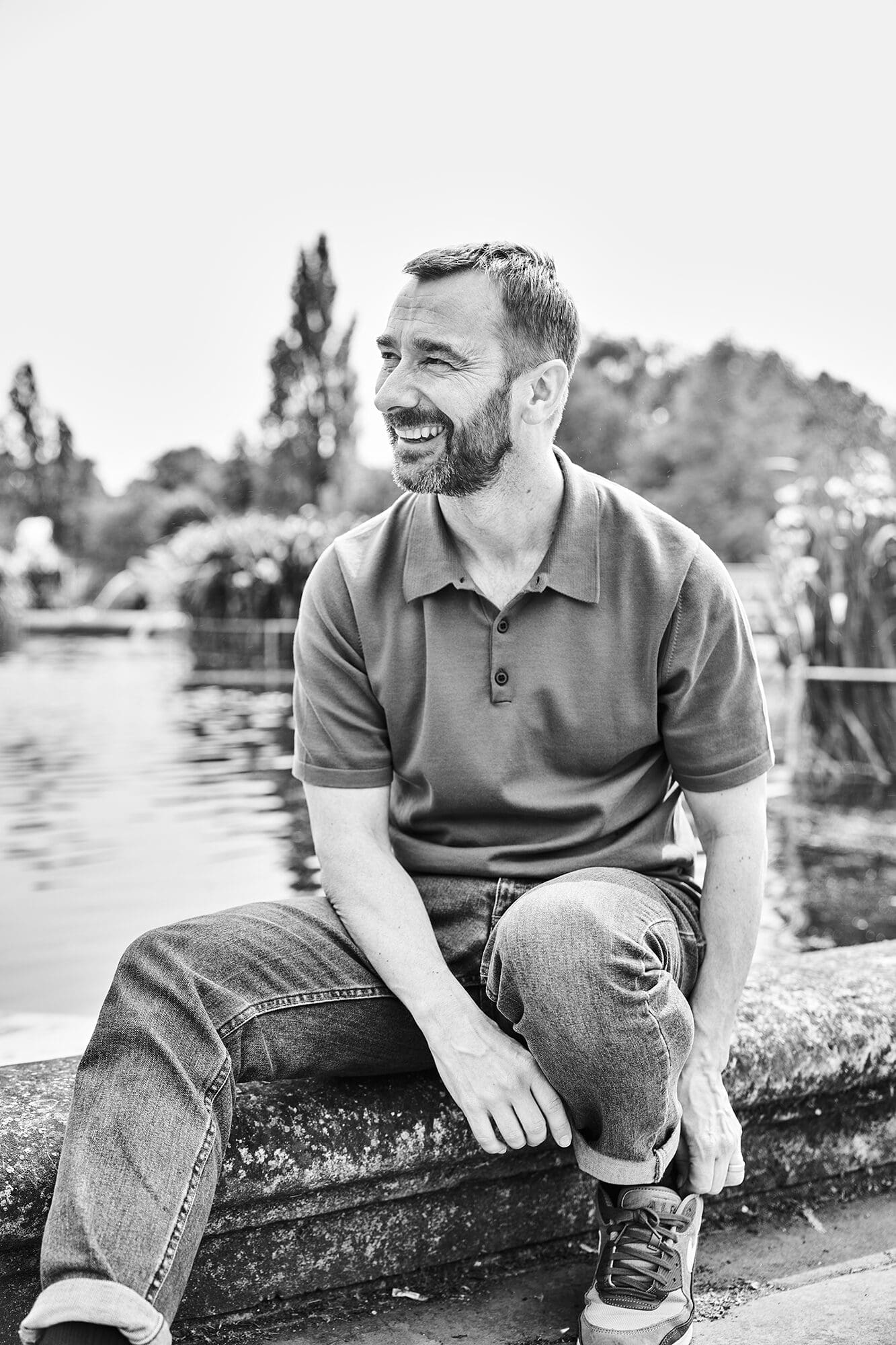
Liz Taylor IMAGE © TOM PITFIELD PHOTOGRAPHY
Do you think the fact that you are so conscious about being a present dad, that it has affected your career choices?
“Yes, that was the reason I left Coronation Street. There were a lot of great things about being at Corrie and it was a hard decision to make. I had been deliberating it for months, because in a sense you’ve got job security – you can potentially be there for a long time; you know when you can take your holidays, and all those things. I was giving that role up with essentially nothing to go into, but my children lived in London, and I didn’t want to be so far away from them. I remember the moment that my son, who was about 2 at the time, broke his leg. I got the phone call and all I could think was ‘I should be there’, but I was in Manchester, and I had to film the next day. That night, I had to go back to my flat alone, when all I wanted to do was be with him and I just realised that I couldn’t do it anymore. Of course, any job can take you away from your kids at times but being in Manchester 5 days a week was really tough. I would come home on Friday evening, and I’d have to go back to Manchester again on a Sunday afternoon. It just wasn’t working, so I don’t regret it at all, but it was still a hard decision to make.”
How do you make it work logistically on a weekly basis, have you managed to find a way to do it that suits you all?
“We’re very close with Catherine and we’re very good friends and the way we do it [and the way we’ve always done it] is, they live between the two houses, we have them Monday and Tuesday, Catherine has them Wednesday and Thursday, and then we alternate the Friday, Saturday, and Sunday, so it’s great and the most we’re ever away from them is 5 days. It also means we get a break, so I can honestly say I’ve never got that point that I just need a break – because I get a break. I know a lot of my peers get to that point, like a lot of people do when they have kids because it’s full on, so we’re very lucky that it works the way it does. It means that when they are there, we’re engaged, we’re our best selves and we’re not exhausted. The other side of it is that the kids get a break from us too, so they really enjoy coming home to us, just as they equally really enjoy going home to their mum. There are three of us, so we literally do have an extra pair of hands, to pick up the slack! It really does work well.”
After Georgia was born you went on to have Hal, was it always your intention to have one than one child together?
“I always say we had Georgia for ourselves, and we had Hal for her. We had done IVF and we had still had an embryo that was frozen, so we kind of thought well why not, lets ‘chuck it in the oven and see what happens’” We all laugh. “But in all seriousness, I think no matter how well you’re doing, parents can drive you mad at times, particularly as you get older, and I think nobody really understands like a sibling. My sister has just passed away, but we were incredibly close and it’s because we were a unit – after our crazy childhood. Even now I see that between my son and my daughter; only the other day my son was in a mood about something, and he wouldn’t talk to me, and he wouldn’t talk to Cameron, and he wouldn’t discuss it with Catherine, he just wouldn’t get into it. So, Georgia said to me, ‘I’ll talk to him’ and within minutes he was sat on her bed letting it out to her. She said to me afterwards, I’ll always tell you what happens, and I said no don’t, tell me if need to know, otherwise you have your relationship with him because that’s really important and I don’t need to know, you can have your private stuff together away from your parents, it’s how it should be. It just made me feel so grateful and relieved, obviously they bicker at times, but just to know that she’s got his back and that he’ll go to her if he needs support just made me think, if I’ve done nothing else, I’ve given them that.”
“- I realised that came from my fears from coming from a broken home.”
Do you think it’s important for children to know that they’re parents aren’t perfect, and to be open with them about that so that they themselves don’t feel the pressure of needing to ‘perfect’?
“Yes, I was talking about this with someone the other day actually, and I’d apologised to the kids after I snapped at them about something, and they were being a bit annoying, but I realised that I didn’t snap at them because of them, I snapped because I felt tired. It wasn’t bad but I just said, ‘I’m really sorry I snapped at you, it wasn’t about you, it was about me’ and I have no issue with saying sorry when I’ve done something wrong. I think it’s important. People often feel like an apology is a sign of weakness, but you should look at it as your owning yourself and your mistakes. It’s also a gift to another person, because if someone apologises to me, and it’s heartfelt and unconditional, then I know I feel good because of that and it’s making your relationship stronger. So, if I can give that to the kids and teach them that it’s alright to say you’re sorry when you’ve done something wrong, because we all get things wrong. And I don’t want them to think that I’m perfect, because kids can have that perception about their parents, and I think they should know that we all make mistakes.”
How important do think it is to be the best version of yourself, in order to be the best parent?
“I think it’s about making sure you are a solid foundation, because yes, I’ve been through some terrible times in my life, but I have consciously tried to sort my s**t out so that I don’t put that on to them. I had a bit of breakdown after I left Corrie , as I had left for the right reasons but suddenly I had job, no money, and things were tough and I got myself into therapy because I needed to help myself, because it’s very easy to look back and blame the fact that my dad wasn’t around and my mum was working all the time, or whatever it maybe be, but it’s very easy to blame your problems on other people and while that might be the reason for your problems at some point you have to take ownership of that. So, seeing a therapist was brilliant for me and helped me to figure out who I was. I think we take care of our physical selves all the time but so many of us don’t take care of our mental health and wellbeing.”
What tips would you give other parents, in particular co-parents?
“I think my advice would be don’t take advice from anyone, find your own way. Everyone thinks that they know the right way how to be a parent, but everyone finds it out for themselves. And from a co-parenting point of view, the most important thing you can do is communicate properly, whether that’s talking about how things will work, logistics, making sure you do it with someone who has the same values and morals, and ideas about bringing up kids.
And also, if something is irritating you, just get it out and just say it. That’s what us three do, don’t get me wrong it’s not easy but then it’s done, and we can deal with it. Because if you don’t speak up, these things just fester and before you know you’re screaming at somebody, about something so small! It’s much better for everyone when you can communicate well, and you move on.”
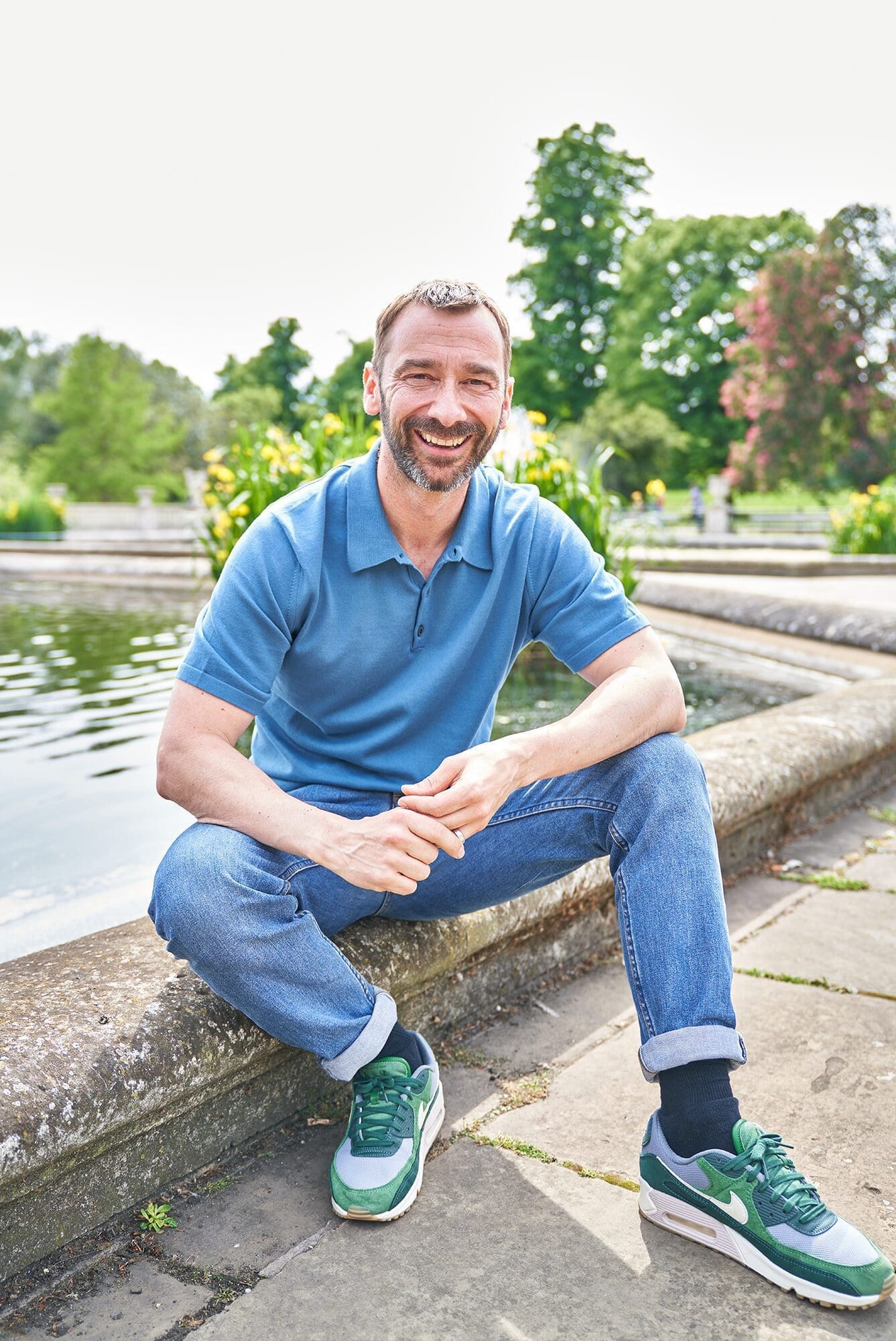
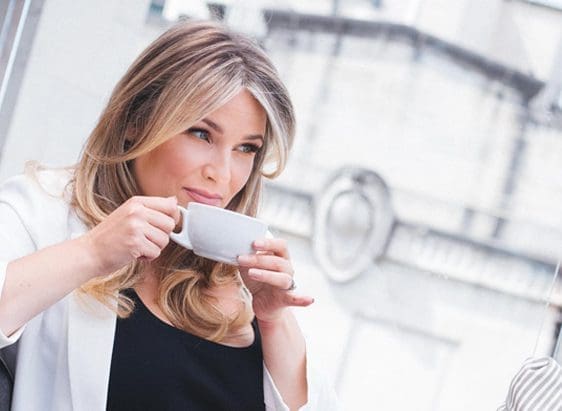
Written by

PHOTOGRAPHY BY TOM PITFIELD
KEEP UP TO DATE WITH BROOD:
Related Articles
Russell Kane & Lindsey Kane
On Reflection with Jenny Powell
Jenny Powell Jenny Powell is one of Britain's best-loved presenters, bursting into the scene at only 16 years old. The inspiring Mum of two, Jenny Powell, already had a jam-packed career spanning almost a decade by the time she gave birth to her eldest daughter...
10 Alternative ways you can level up your performance
Gaining optimum performance in all areas of our life is surely a goal that many of us are all trying to achieve?
Who doesn’t want to look better, feel better physically and mentally, perform better (in all areas!) and have a stronger mindset?
I absolutely do.



